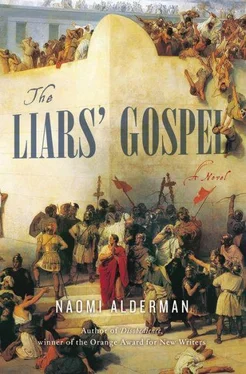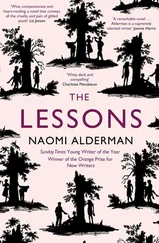She picks Iov up and passes him to her friend Rahav to hold as she stares intently at the man on the back of the mule. The half-dead man is not her son. How could he be? She notices that two fingers on his right hand are black. He’ll lose them, painfully. If he’s lucky.
They place him in Amala the widow’s house and put him to bed with the dogs, for warmth. He sleeps the night, though they expect him to die, and in the morning begins to rouse, a little, enough to flutter his eyelids and take drips of water from a soaked rag. The pain from his blackened fingers keeps him moaning constantly, even in his sleep, a low keening wail like an abandoned newborn. He shivers and sweats and holds the injured hand like a claw. They fear a fever. They call for the blacksmith, who performs the necessary deed with kindness, that is to say: swiftly. He screams of course, a strangled, terrified howl, but that night he takes a little soup and sleeps deeply. He still has not spoken to say who he is, although he understands them when they say “soup” or “water.” They wonder if he is a Jew at all, and not a Syrian or a Greek.
It is four more days until he speaks. They take turns feeding him bone soup or bread soaked in milk. Among themselves, they murmur. He is not as young as the light bundle of him crumpled in the cave had suggested, but not so old as the lines on his face. His beard has not come in yet, except in mottled patches. He is perhaps fifteen or sixteen. And where are his people? There is one obvious answer. Every year, some village rebels against the Romans, refuses to pay the tax, claims they cannot pay — often it is true, they cannot pay. And the tax collectors report the rebellion, and soldiers are dispatched. Every year, some village is burned, its men put to the sword, its women and children to flight. It is not likely that a boy as young as this would have been a ringleader, would be remembered by a soldier. It is not likely that it is dangerous to have him here. Nonetheless, the old men mutter.
On the fourth day, when they come to give him his soup, they find he has woken and is patting the dog with his whole hand, keeping the injured one close to his chest. He is murmuring to the dog in good, intelligible Aramaic.
He looks up guiltily as Amala and Rahav enter the room with his soup. He knows they have heard him speaking. His good hand is twined in the dog’s fur and the animal stirs and whines as it feels him tense.
Rahav puts the tray on the floor, just out of the boy’s reach. Her arms are folded. She glares at him. Rahav’s children are the best behaved in the village, mostly out of fear.
“Well,” she says, “we’ve fed you. Now, who are you?”
The boy glances between Amala and Rahav. He looks hungrily at the soup.
“Is this Natzaret?” he says. “Did I reach Natzaret?”
They tell him it is. He did.
A change comes over his face. He sits up a little straighter, sets his jaw, as if facing a difficult job.
“Natzaret in the Galil?”
They tell him yes, again. And they cannot discern whether he is glad or afraid, such a shining-eyed sharpness comes over his face.
“The village of Yehoshuah the Teacher?”
And Amala and Rahav glance at each other with a sort of sad surrender. Of course, this. Out in the street, the little boy Iov is playing with some of the other children. Rahav sends him to fetch his mother, Miryam.
The rabbis say: when a loved one dies the sword is at your throat, and every way you turn your head it is there, in front of you.
So, this is how she is. When she grinds the wheat, she thinks of him. And when she soaks the cloths, she thinks of him. And when her youngest son, Iov, comes running to her, yes, it is her Iov, the foolish child who got his hand stuck in a jar because he would not unclench his fist to let go of the dried fig he’d found. But it is also that first little boy, her eldest son, the first child who ever skidded to a halt in the muddy place by the chicken enclosure shouting “Ima, Ima!”—“Mummy! Mummy!” She is distracted by the constant double image.
Iov is saying something. He kicks at a stone. The snow has turned to slush and the thin rain will soon wash it away entirely. He digs his toe into the hole left by the stone.
“Don’t do that,” she says, “you’ll wear out the leather.”
And he looks at her sadly, because she spoke more sharply than she’d intended.
“But Ima, Ima, did you hear me? They’re looking for you, at Amala’s house, they’re looking for you! They want you to go and see that man with half a hand!”
She asks him why, and his mouth twists and his eyes open very wide and she understands that he does not want to answer. So she has an idea, already, of what it is.
The women waiting outside Amala’s home aren’t waiting for her. They say nothing when she comes, most of them can’t meet her eyes. One or two touch her on the back or shoulder as she passes. The rest are simply afraid. They want to know if this boy is a curse she has brought on them.
Inside the smoky, dark room, he is sitting on a heaped mattress. Someone has given him a woolen jerkin, with a thick robe on top of it. They add bulk to his thin frame. When she enters he stands, a little shakily, to greet her.
She says, “Who are you?”
He looks into her eyes. He has an unsettling trick: that every word he says, he seems to mean with a profound depth of feeling.
“I am Gidon,” he says, “from Yaffo.”
“And why have you come here, Gidon of Yaffo?”
His eyes are so clear and innocent that she becomes afraid. Innocence can destroy three times as quickly as guile. At least the cunning can be reasoned with or bribed.
“I have come to seek the village of Yehoshuah the Teacher, to find his friends and family here, to meet them and to befriend them.”
She breathes in and breathes out.
“He was a traitor, a rabble-leader, a rebel, a liar and a pretender to the throne. We have tried to forget him here.”
“Did you know him?” Gidon says.
She remains silent.
“Did you know him?” he repeats.
The fire spits. Some wet log sending a shower of sparks past the circle of stones onto the moist earth floor.
“I was his mother,” she says.
A wetness is starting in his eyes, he is shaking.
“Oh, blessings are on you,” he says, “blessings are on you, and on your womb and breasts, because of the son you have given the world. A thousand thousand blessings from He Who is in All Places, for your son Yehoshuah.”
Her heart is a stone. Her mouth is a closed door.
“Go home.”
His eyes are shining. She thinks he might be about to embrace her or kiss her hand or fall to his knees before her.
“Go home,” she says again, before he can do any of these things. “We do not want you here.”
And she leaves the room before he can say any more to her.
She remembers the screaming trees that night.
She thinks of them many days, and of what happens to those who challenge and fight and argue. And how little this boy seems to understand of where his words will lead.
She remembers the screaming trees and she thinks: if I can bear not to speak to him, it will be better for him. But she knows she does not have that strength.
The boy will not leave, of course. They do not understand how one simple, addle-headed, half-handed boy can be so stubborn. They offer him food for the journey. They offer him the warm clothes as a gift. When Sha’ul the merchant passes by on his way to Jerusalem, they suggest he take the boy with him as a help against bandits, and Sha’ul, whom they have known for twenty summers, is not unwilling — but the boy refuses.
He will work, he says. He will repay the kindness they have shown him. He will sleep in the stone shelter made for the goats. The weather is becoming warmer, it will not be a hardship to sleep there if he builds a small fire. His hand is mending, look, the wound has healed clean. He can work. If they will give him a bowl of food each day for his trouble, he will tend their crops and mind their animals and mend their gap-toothed walls. They shrug their shoulders at last. If he wants to be the madman of their village, so be it.
Читать дальше












